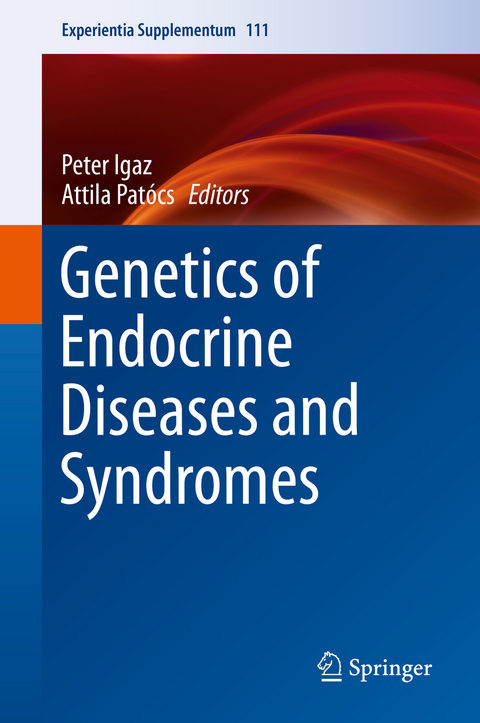
Genetics of Endocrine Diseases and Syndromes
Springer International Publishing (Verlag)
978-3-030-25907-5 (ISBN)
This book provides a comprehensive overview of the genetic basis underlying endocrine diseases. It covers both the molecular and clinical consequences of these genetic defects, as well as the relevance for clinical care, highlighting issues of genetic counseling.
Several endocrine diseases have a genetic background, and contemporary research in the field plays a crucial role in the clinical care of endocrine diseases. In recent years, there have been major developments in our understanding of the genetic basis of endocrine diseases. Several novel genes and mutations predisposing individuals to monogenic endocrine diseases have been discovered, and with the advent of next generation sequencing, a huge amount of new data has become available. Further, novel molecular mechanisms, such as genomic imprinting, have been implicated in the pathogenesis of endocrine diseases.
A better understanding of the genetic background of these diseases is relevant not only from the research perspective, but also in terms of clinical care. As such, this book is an essential read for both researchers and clinicians working in the field.
lt;p>Peter Igaz MD MSc PhD DSc is full professor of medicine and head of the 2nd Department of Internal Medicine at Semmelweis University Budapest. He has boarding exams in internal medicine, endocrinology and clinical genetics. His research interests include adrenal tumors, multiple endocrine neoplasia syndromes and neuroendocrine tumors focusing both on classical genetics, microRNAs and other non-coding RNA molecules. He has published over 140 scientific papers.
Attila Patocs MD MSc PhD DSc is associate professor of molecular genetics and laboratory medicine at the Department of Laboratory Medicine of Semmelweis University, and also the head of molecular genetics laboratory at the National Institute of Oncology in Budapest. He has boarding exams in laboratory medicine and molecular genetic diagnostics. His research is focused on hereditary cancer syndromes, endocrine tumors and biomarkers. He has published over 180 scientific papers.
Part 1: Basics of Genetics.- Chapter 1. Basic concepts ofgenetics.- Chapter 2. Brief description of inheritance patterns.- Chapter 3. Family screening and genetic counseling.- Chapter 4. Brief summary of the most important molecular genetic methods (PCR, qPCR, microarray, next generation sequencing etc.).- Part 2: Endocrine diseases inherited as monogenic traits: Alterations of hormones and hormone receptors.- Chapter 5. Syndromes of resistance to thyroid hormone action.- Chapter 6. Glucocorticoid resistance.-Part 3: Endocrine diseases inherited as monogenic traits: Hereditary diseases predisposing to endocrine tumors.- Chapter 7. Overview of genetically determined diseases/multiple endocrine neoplasia syndromes predisposing to endocrine tumors.- Chapter 8. Hereditary diseases predisposing to pheochromocytoma (VHL, NF-1, paraganglioma syndromes and novel genes).- Chapter 9. Diseases predisposing to adrenocortical malignancy (Li-Fraumeni syndrome, Beckwith-Wiedemann-syndrome, Carney-complex).- Chapter 10. Genetics of pituitary tumors.- Chapter 11. Timeline of advances in genetics of primary aldosteronism.- Chapter 12. Congenital adrenal hyperplasia.- Part 4: Endocrine diseases inherited as monogenic traits: Monogenic diseases predisposing to hormone deficiency, infertility and diabetes mellitus.- Chapter 13. Pituitary transcription factor mutations leading to hypopituitarism.- Chapter 14. Hereditary neurohypophyseal diabetes insipidus.- Chapter 15. Nephrogenic diabetes insipidus.- Chapter 16. Monogenic forms of male infertility (including androgen resistance).- Chapter 17. Genetic causes of female infertility.- Chapter 18. Monogenicforms of diabetes mellitus.- Part 5: Example of a multifactorial disease and chromosomal alterations in endocrine diseases.- Chapter 19. Genetics of obesity.- Chapter 20. Chromosomal aberrations with endocrine relevance (Turner-syndrome, Klinefelter-syndrome, Prader-Willi syndrome).
| Erscheinungsdatum | 18.10.2020 |
|---|---|
| Reihe/Serie | Experientia Supplementum |
| Zusatzinfo | XIX, 473 p. 72 illus., 51 illus. in color. |
| Verlagsort | Cham |
| Sprache | englisch |
| Maße | 155 x 235 mm |
| Gewicht | 753 g |
| Themenwelt | Studium ► 2. Studienabschnitt (Klinik) ► Humangenetik |
| Naturwissenschaften ► Biologie ► Genetik / Molekularbiologie | |
| Schlagworte | endocrinology • epigenetics • Genetics • genotype-phenotype interactions • monogenic diseases |
| ISBN-10 | 3-030-25907-2 / 3030259072 |
| ISBN-13 | 978-3-030-25907-5 / 9783030259075 |
| Zustand | Neuware |
| Informationen gemäß Produktsicherheitsverordnung (GPSR) | |
| Haben Sie eine Frage zum Produkt? |
aus dem Bereich


